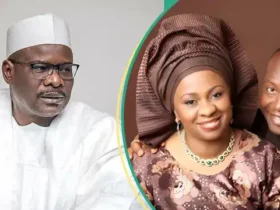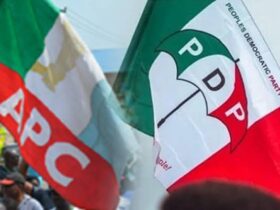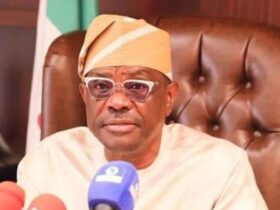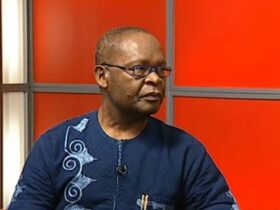
In a breakfast session organized by Parthians Partners in Lagos on Tuesday, Bismarck Rewane, the CEO of Financial Derivatives Company Limited, has disclosed that Bola Tinubu administration’s target of achieving a $1 trillion economy in the next eight years was becoming more like a pipe dream, citing the undervaluation of the naira and uncertainties in the oil market.
The economist argued that despite the depreciation of the naira, market analysis showed that the country’s currency was 31.43 per cent undervalued on the parallel market, suggesting a true value of N800.19/$. He also forecast that in 2024, the naira, with the right policies, would strengthen and stabilise.
Speaking on the 2024 appropriation bill and the federal government’s target of $1 trillion economy in eight years, Rewane said, “Oil price is about $76 per barrel today, the price per barrel is at $74 per barrel.
“Normally, your benchmark price should be around 20 per cent below the spot price and now we are already under. Not only that, the production the president announced was a target of 1.7 million to 1.8 million barrels per day and, then, 24 hours later OPEC cuts your quota to 1.5 million per day and revenue is price and quantity.
“So, on the price side, you are under, as well as the quantity. So the goal of achieving a $1 trillion economy in eight years is becoming more of a pipe dream.”
Commenting on the currency, Rewane stated, “When you divide the price of goods in Nigeria and the price of goods in New York, you will get about N800 to a dollar. The official market is N806.73 and the parallel is now N1200/$1, so something is happening as the currency is undervalued at 31.43 per cent. How do we correct this undervaluation?
“You have to correct it by changing the market structure and allowing the wholesale option to take place where the central bank can participate. When that happens, the market would begin to stabilise.
“We believe that the currency will begin to appreciate sometime going into 2024. The currency will stabilise.”
Addressing inflation, Rewane anticipated a rise in early 2024 due to ongoing market reforms and parallel market currency volatility.
However, he projected a moderating trend by mid-year, expecting average inflation to settle at 23.6% in 2024 compared to 24.4% in 2023.
This decline is seen as a trigger for the natural appreciation of the exchange rate, aligning with Tinubu’s goal of reducing inflation to 21.7%.
READ MORE: Powerful Nigerians Involved in Illegal Mining, Funding Banditry, Terrorism —Alake
Rewane disclosed that, “Inflation will continue to rise in early 2024 due to market reforms and persistent currency volatility on the black market. However, base effects are expected to kick in by mid-year with inflation moderating to an average of 23.6 per cent in 2024 from an average of 24.4 percent in 2023, and once inflation begins to decline, the exchange rate would appreciate naturally.
“Tinubu said he is going to get it down to 21.7 per cent, we would look and see how, but we think that would happen.”
He also said, “The number of foreign participation in the Nigerian investment scene is quite low at 11 per cent. But in 2024, we expect it to be 20-25 per cent.”
Rewane revealed that Nigeria’s economic problems were deeply rooted in structural imbalances and overbearing and bloated government size.
He said, “Nigeria’s economic problems are structural as well as current. Fiscal pressures are there because the normal size of government activities compared to the direct and indirect impact of government activities is a different story.
“The federal government has an overbearing fiscal dominance. The external imbalances are growing because we have leakages in the system.”
Furthermore, Oluwaseun Dosunmu, the Head of Investment Research at Financial Derivatives Company Limited, predicted potential mergers among companies, particularly those listed on the Nigerian Exchange Group (NGX), following the recent pronouncement of bank recapitalization.
Dosunmu suggested that such consolidations could result in a reduced number of banks compared to the current count.
In conclusion, Rewane underscored the importance of addressing structural issues and implementing effective policies to overcome the economic challenges facing Nigeria.








Leave a Reply